- Home
- Victor Gischler
Go-Go Girls of the Apocalypse: A Novel
Go-Go Girls of the Apocalypse: A Novel Read online
WHAT PEOPLE ARE SAYING ABOUT VICTOR GISCHLER’S WORK
“First, who wouldn’t want to read a novel titled Go-Go Girls of the Apocalypse? Second, who could have guessed the book was even better than the title? Part Christopher Moore, part Quentin Tarantino, Victor Gischler is a raving, badass genius.”
—JAMES ROLLINS, New York Times bestselling author of
Map of Bones and Black Order
“If it’s all going to go to hell, you might as well have some Go-Go Girls of the Apocalypse to go with it. Weird just doesn’t say it for this one. Gischler gives weird a kick in the butt, sends it right over the edge of the abyss. Wild fun.”
—JOE R. LANSDALE, author of Lost Echoes and Bad Chili
“Go-Go Girls of the Apocalypse is funny, mordant, crazed, riveting, sardonic—and despite all that, it’s got a plot. Bravo for Victor Gischler.”
—MIKE RESNICK, Hugo and Nebula Award–winning author
“Go-Go Girls of the Apocalypse proves, if proof were needed, that Victor Gischler is among the most demented, nimble, and flat-out hilarious American satirists working today. Listen closely: that sound you hear, somewhere out there, is Vonnegut’s applause.”
—SEAN DOOLITTLE, author of The Cleanup
“If Pynchon ever decided to write an insane action novel, this would be it. All-out sustained brilliance; nobody is writing the unique lunacy that Victor Gischler is.”
—KEN BRUEN, author of The Guards and American Skin
ALSO BY VICTOR GISCHLER
Gun Monkeys
The Pistol Poets
Suicide Squeeze
Shotgun Opera
Go-Go Girls of the Apocalypse
Victor Gischler
Touchstone
A Division of Simon & Schuster, Inc.
1230 Avenue of the Americas
New York, NY 10020
This book is a work of fiction. Names, characters, places, and incidents either are products of the author’s imagination or are used fictitiously. Any resemblance to actual events or locales or persons, living or dead, is entirely coincidental.
Copyright © 2008 by Victor Gischler
All rights reserved, including the right to reproduce this book or portions thereof in any form whatsoever. For information address Touchstone Subsidiary Rights Department, 1230 Avenue of the Americas, New York, NY 10020
TOUCHSTONE and colophon are registered trademarks of Simon & Schuster, Inc.
Library of Congress Cataloging-in-Publication Data
Gischler, Victor.
Go-go girls of the apocalypse / Victor Gischler.
p. cm.
“A Touchstone book.”
1. End of the world—Fiction. 2. Satire. I. Title.
PS3607.I48G47 2008
813'6—dc22 2007033601
ISBN-13: 978-1-4391-0558-0
ISBN-10: 1-4391-0558-8
Visit us on the World Wide Web:
http://www.SimonSays.com
For Anthony Neil Smith and Sean Doolittle, who both
assured me I had a good book on my hands even before I
believed it myself
ACKNOWLEDGMENTS
I need to add some names to the list of usual suspects. David Hale Smith has been one hell of an agent…Thanks for catching everything I’ve thrown at you. Thanks to Zach Schisgal, Shawna Lietzke and the team at Touchstone/Fireside for keeping me on track. And extra thanks to my wife, Jackie, and son, Emery, for putting up with me. Last but not least, many thanks to all those readers who keep coming back.
When the people saw that Moses was so long in coming down from the mountain, they gathered around Aaron and said, “Come, make us gods who will go before us. As for this fellow Moses who brought us up out of Egypt, we don’t know what has happened to him.”
—EXODUS 32:1
CONTENTS
ACKNOWLEDGMENTS
I
II
III
IV
V
VI
VII
VIII
IX
X
XI
XII
THE MUSCLE EXPRESS
XIII
XIV
XV
XVI
LADIES
XVII
XVIII
XIX
DINNER AND ENTERTAINMENT
XX
XXI
XXII
XXIII
XXIV
HIKING AND CAMPING
XXV
XXVI
XXVII
XXVIII
XXIX
XXX
THE GREATEST SHOW ON EARTH
XXXI
XXXII
XXXIII
XXXIV
XXXV
XXXVI
XXXVII
XXXVIII
THE LOST CITY OF ATLANTA
XXXIX
XL
XLI
XLII
XLIII
XLIV
XLV
XLVI
XLVII
XLVIII
XLIX
L
THE ROAD WARRIORS
LI
LII
EPILOGUE
I
This is how Mortimer Tate ended up killing the first three human beings he’d laid eyes on in nearly a decade:
A wreath of cloud lay smooth and still about the top of the mountain like bacon grease gone cold and white in a deep, black frying pan. The top halves of evergreens poked through the cloud, frosted from last night’s snow. The final days of winter, not too cold—Mortimer Tate estimated maybe thirty degrees. The thermometer had burst in the third year, that most bitter winter when it had gotten to twenty below or more. The thermometer had been made in America by a small company in Ohio.
Nothing was made to last anymore, Mortimer’s dad had been fond of saying.
Mortimer sat at the window of the cabin, which had been built directly in front of the cave. The cave stretched back deep into the mountain. Mortimer sipped tea brewed from ginseng and tree bark he collected and dried himself. The coffee had run out the first year. So many things had run out that first year.
Mortimer watched the men come up the mountain, had seen them rise up through the mist and had blinked at them, thinking he’d cracked up at last. But they were real, rifles in front of them, not trying too carefully for stealth, but neither shouting nor taking the mountain for granted.
He considered going back into the cave to the gun locker, maybe getting the twelve-gauge or even something deadlier, but then he’d lose sight of the men and he didn’t want to emerge from the cave again only to find they’d gone or had spotted the cabin. And anyway he had the police special in the pocket of his army-surplus parka. That should be enough. He wanted to talk, not shoot, but of course he had to be careful.
He didn’t figure they’d seen the cabin, obscured as it was by the pines and two months’ snow. It was possible he could sit right there, and the men would pass by and never be seen again. Nobody had been up this far before, at least nobody Mortimer had seen. Maybe they’d hunted the game out farther down and were up after meat. Mortimer himself had killed a big buck three weeks ago and had eaten venison four nights in a row before drying out the rest for jerky.
Goddamn, he was sick of jerky.
I’m stalling, Mortimer thought. He didn’t want the men to pass without speaking to them. Now that he saw them, he was desperate to find out, get news of the world below. But he was afraid too. There were three of them.
He could call out to them right now and be safe holed up in the cabin. They couldn’t get at him there. Not even if
all three came at once. They’d have to climb up the rocks and snow and he could pick them off easy with the police special. But then they’d know about the cabin and the cave. They could come back with a dozen or a hundred, and that wouldn’t do.
He’d have to slip down the side and try to catch one on the flank, open up a dialogue, and then maybe they could find out about each other. Maybe things were back to normal. The portable radio had devoured all the spare batteries so fast, ran out even before the coffee, but it had all been bad news, and when the last batteries had finally given up the ghost, Mortimer wouldn’t have replaced them even if he’d had more. He hadn’t been able to stand it, couldn’t stomach another minute, the play-by-play of the world shaking itself to pieces.
It had been a long time, and maybe things had stabilized. That was a thought, and it turned into a hope; Mortimer found himself sliding down the incline from the thick plank door of the cabin and ducking into a stand of trees. The leftmost of the men was just on the other side. Mortimer went through quietly, not showing a weapon. Strike up a conversation. Sure. Maybe they’d be happy to see him.
He weaved and ducked among the pines, finally caught sight of the first man, ruddy cheeks, dirty red hair with a red-brown beard. Patched denim pants and work boots, thick corduroy coat, also patched. A red band around one sleeve. He held a deer rifle, bolt action, .308 caliber. Mortimer was so close he could see the rifle was a Remington.
Mortimer had one hand in the pocket of his parka, wrapped around the police special. He raised the other hand in greeting.
“Hey—” Mortimer’s own voice surprised and startled him, and he cut off the greeting. Mortimer marveled momentarily at the strange voice, his own voice, how loud and croaky it sounded in the still morning. When was the last time he’d uttered a single syllable? He only pondered it a split second, because the stranger had already turned, big-eyed, mouth a shocked O of surprise, and was bringing the deer rifle around.
“No!” Mortimer threw up his free hand in a “stop” gesture. “Wait!”
But neither of them could wait. The rifle barrel had swung even with Mortimer’s belly, and he thrust the police special forward and squeezed the trigger. The shot split the winterscape with a crack, white down exploding from the hole in the parka’s pocket. The bullet caught the stranger high in the left side of the chest, a splash of red arcing and spraying and landing around him, harsh and bright in the smooth white terrain.
“Harry!” Another shot whizzed past Mortimer’s ear.
Mortimer pulled the revolver, moved sideways among the trees as the other two ran toward him, snow crunching. He huffed breath, loud in his ears, steam billowing from his open mouth, eyes and nose wet from the cold and exertion. He fired once and the two guys slowed into a crouch, one going to a knee and shooting. The shot rent Mortimer’s sleeve, more down swirling in his wake. They got up again and ran at Mortimer, who ran back at them, throwing everything into the encounter, howling and jerking the trigger three more times.
Two shots went high. The third took the kneeling shooter in the left eye, which popped and gushed blood and goo and shredded eyeball. His scream cut off in a strangled gulp, and he fell back.
The last stranger turned and ran, and this alarmed Mortimer more than when they’d shot at him. He couldn’t let him bring others. He crunched in the snow after him. “Wait!”
They both ran faster.
“Wait!”
He didn’t wait.
Mortimer fired. The shot caught the fleeing stranger between the shoulder blades. The man’s arms flew out, the rifle tumbling into the snow. He fell face forward. Mortimer kept running until he was right up next to the body, dropped to his knees. “Oh, no.” He turned the man over, but he was dead. “God damn it.”
The first human beings he’d seen in nine years.
“Typical.”
II
Using the sled he’d made to haul firewood, Mortimer took the bodies a mile or so away for burial. If the strangers had friends, Mortimer didn’t want the blame for the killings. It had not been his fault, he’d convinced himself. He’d wanted to talk, and they’d drawn on him.
He still felt sorry about it.
Mortimer soon developed a little routine. He flailed at the frozen earth for a few minutes with shovel or pickax. Then he’d catch his breath by the small fire he’d built and search the pockets of the dead men. They carried precious little. One had a condom in his wallet and nothing else. That’s optimistic, Mortimer thought. He discovered that each man had only one bullet in each rifle and carried no other ammunition. They could not possibly have been coming for him and must have been hunting.
All three wore red armbands.
He’d exhausted himself by the time he put the first two into shallow graves, covered them back over with dirt and rock. Another heavy snowfall would completely obscure the deed.
He leaned the third body in a sitting position against a young pine. He liked the look of this guy, the same brown-red facial hair except his moustache had been curled up into friendly handlebars. The face was pudgy and jolly in spite of the fact that all life had gone dark in the eyes, which were wide open, round and glassy.
“I’m sorry I had to do that,” Mortimer said. “It was the other guy, almost got me with that deer rifle. Just wasn’t anything else I could do.”
Mortimer nodded and shrugged as if listening to the corpse’s reply. “I know, I know. I should’ve yelled at you from the cabin instead of creeping up on you. But see it from my point of view. I had to make sure you guys were square first, right?”
The man’s dead eyes appraised him unblinkingly.
“You were surprised to see me up here,” Mortimer said. “A good place to hide, this far up. I’m probably the only fellow in East Tennessee who was ready for it.”
The fire crackled. Mortimer put on another fistful of sticks. Nothing stirred on the mountain.
“If it hadn’t been for my wife,” Mortimer admitted, “I’d have never come up here. It took both the end of the world and Anne riding my ass to sign those divorce papers. One wasn’t enough to run and hide. At the time, the divorce seemed worse. Can you believe that? I guess because it was personal to me.”
Mortimer took the pickax and started on the third grave, stopped when he felt winded again and threw more sticks on the fire.
Mortimer resumed the conversation. “Her name was Anne. She wanted a divorce. I didn’t. We were both angry. We didn’t know why, just that our unhappiness had to be the other’s fault, and damned if I was going to pay her one goddamn cent of alimony, you know? I was raised to work things out.”
He got up, dug some more, came back to the fire.
“Anyway, you could see it all coming. I don’t think anyone really thought it was the end, not the absolute final end, but just that it would be bad. And so I found the cave and started getting it ready. But really, I was leaving Anne. I was going to take the top of this mountain for myself and let her have the whole rest of the world, and all the trouble was just sort of an excuse. And I would just be gone, you know? And if she wanted those divorce papers signed, she’d damn well have to come find me. She’d have to earn it.”
He finished the hole, but didn’t put the body in right away. He still wanted to talk. He realized he was practicing. It was a time for talking again, and he wanted to remember how, wanted eventually to talk to someone who would talk back. The crushing loneliness had crept up on him so gradually that he hadn’t even noticed it until he’d stood over the men he’d killed. He could have asked them so much, and maybe they’d have known some jokes and he could’ve laughed.
Mortimer laughed out loud to see if he recalled what it sounded like. It felt fake and tin in his throat, and he seemed to remember that a legitimate laugh came up from the belly. He decided not to practice laughing.
He conjured Anne’s face in his mind, the sharp angles and bright, alert eyes, hair a rich brown. Skin so clear and white. “Huh.”
Mortimer kept
talking as he grabbed the man by the wrists and dragged him toward the hole. “I don’t guess any of this makes a damn bit of difference to you. I wonder if you have a wife. I sure am sorry for her if you do.”
Mortimer dropped him in the hole. “Again, sorry.” He covered him up.
III
In back of the cabin was an opening four feet high and five feet wide that led into the cave. Mortimer stopped at the gun locker first, took the keys hung on a string around his neck, picked out the correct one and opened the locker. He reloaded the police special.
It was a big gun locker, long guns on top, ammunition and pistols in the drawers below. He had two more police specials in case something happened to the first and a thousand rounds of .38 ammunition sealed against the elements. He had a twelve-gauge pump shotgun, a lever-action .30-06, a .223 Ruger Mini-14 with two thirty-round banana clips. There was also a 9 mm Uzi that Mortimer had converted to full auto with online information, when there had been such a thing as the Internet.

 The Shadow Sorceress
The Shadow Sorceress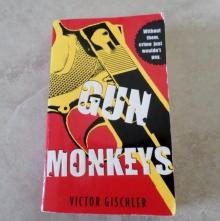 Gun Monkeys
Gun Monkeys Go-Go Girls of the Apocalypse
Go-Go Girls of the Apocalypse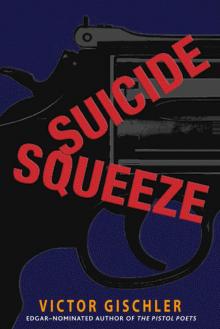 Suicide Squeeze
Suicide Squeeze The Pistol Poets
The Pistol Poets POPCORN
POPCORN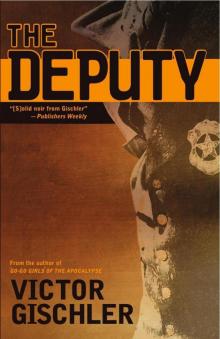 The Deputy
The Deputy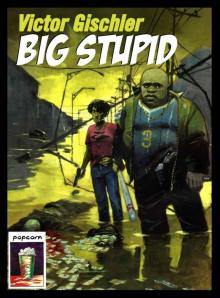 Big Stupid (POPCORN)
Big Stupid (POPCORN) Pistol Poets
Pistol Poets Shotgun Opera
Shotgun Opera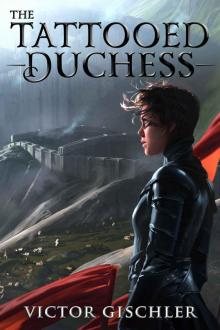 The Tattooed Duchess (A Fire Beneath the Skin Book 2)
The Tattooed Duchess (A Fire Beneath the Skin Book 2) Ink Mage
Ink Mage Go-Go Girls of the Apocalypse: A Novel
Go-Go Girls of the Apocalypse: A Novel Stay
Stay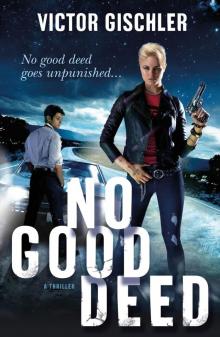 No Good Deed
No Good Deed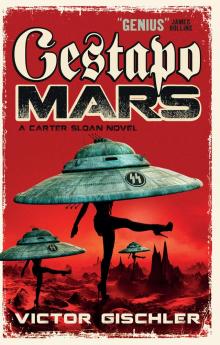 Gestapo Mars
Gestapo Mars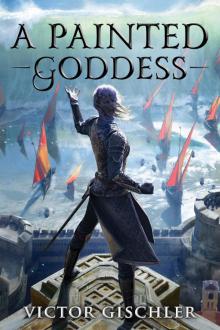 A Painted Goddess
A Painted Goddess